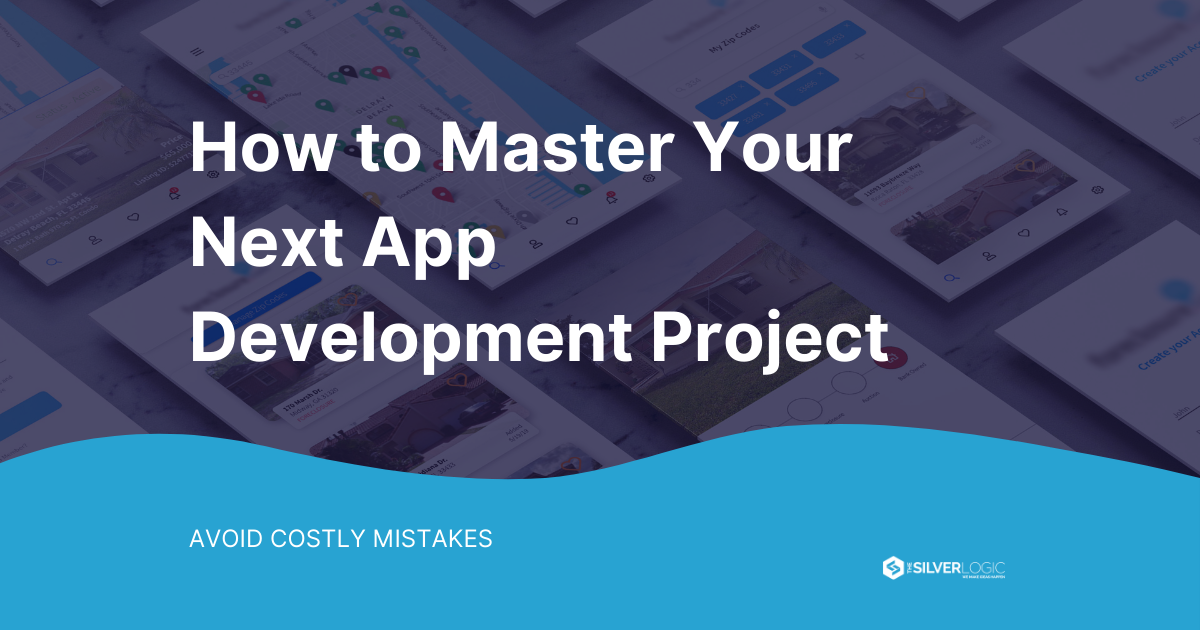How to Master Your Next App Development Project

Why Business Apps Development Succeed or Fail & How to Avoid Costly Mistakes
In 2015, Comscore’s 2015 U.S. Mobile App Report revealed that youth aged 18-24 spent an average of 93.5 hours each month using smartphone apps. That same year, the national average of apps used per person was 9 daily and up to 30 each month, higher than ever before and steadily increasing into the new decade. It should be no surprise that field experts are calling this current app market the new “Digital Age Gold Rush,” highly lucrative for those who develop successful apps.
Statistica estimated mobile phone users worldwide reached 4.9 billion as of 2018. This steady growth is enabling the global mobile app marketplace to grow, year after year:
- Mobile app downloads reached an estimated 205.4 billion in 2017
- The growth of mobile downloads is projected upwards of 258.2 billion by 2022
With countless entrepreneurs looking to capitalize on this app market and hundreds of apps being uploaded to app marketplaces daily, digital competition has never been fiercer. So, how can your app have the chance to be the next Airbnb or Delivery Dudes?
Our team here at The SilverLogic in Boca Raton, Florida has seen both local and national projects fail before they were even given a chance to succeed. We have found that their success or failure boils down to how effective their teams perform and how experienced they are in the industry’s decision-making—in application design, development, and marketing. By trying to include every feature their potential users might need before onboarding even a single user, for example, new platforms often run out of funding before even getting the app to market. A proper app development strategy is key.
Read: Is Your App Idea A Viable Business Opportunity?
This article will go over the comprehensive measures that companies need to take to reduce the chances of their app failing, potentially saving thousands of dollars and hours, and the company’s public reputation. 
The 3 Pillars of Success (or Failure) in Business App Development
Nearly every app idea goes through the journey from idea to prototype, build to test, plan to execute, and launch to update. The three realms of work (or pillars of) success/failure are:
- The App (Idea, User Experience, User Interface, etc.)
- Ideas & Execution
- Business Strategy
Success requires extensive research, consistent hard work, and the ability to adapt to shifting consumer needs. Investing time in research—such as by reading this article—teaches you where to focus your efforts and how to plan for success while minimizing wasted time, money, and effort. In this way, all three pillars of success can excel. Research is required to select a successful app idea, execute it properly, and make it financially viable, corresponding with each pillar.
Why Do Apps Fail?
There are many reasons apps fail to impact the market or turn a profit. Whether the reasons are internal—such as with app marketing, execution, design, or poor business strategy for income—or external—like the launch timing or shifting consumer preferences—success is only available to those with savviness of the app market and knowledge of strategic options for app development.
App Development Failure: The App Solution is Generic
When you have a new app idea, chances are that someone else may have already executed the same concept and created an existing application for it that is already on the market, giving them a solid time-based advantage. The first step in deciding on a project is to research your idea, to discover how your app can solve a problem or provide a user experience that is unique compared to adjacent solutions. Additionally, it has to prove valuable to users to the point where they would want to share it with their friends and colleagues. What makes your app stand out? What puts it ahead of the competition? Oftentimes, this decision-making involves investigating existing applications to find holes in quality and utility within certain spheres of functionality within the market. Delivery, information, social networking, shopping, and every other function that apps can serve have niches within them, and finding the proper audience and functionality is key to finding success.
Failure, on the other hand, may be due to the app having a poor user experience, poor performance, or any number of other app-related decisions that have come up short. Research, testing, and user feedback will be your first and last line of defense against failure in this sphere.
Here are 10 potential reasons apps fail due to app design and functionality:
- Lack of Proper Market Research
- Poor/Rushed QA Testing for the App &/or Updates
- Ineffective/Bad User Interface (UI) Design
- Bad User Experience due to poor UI design
- Issues With Performance & Memory Usage
- Limited Functionality on Core Features + Unnecessary Features
- Wrong Platform (web vs native mobile app, for example)
- App Is No Longer Current/Relevant
- App Doesn’t Follow Guidelines (iOS, Android) and is Removed From the App Store
- Undefined or Poorly Defined Minimum Viable Product (MVP)
Make sure to ensure your idea is a viable business opportunity (read our article “Is Your App Idea a Viable Business Opportunity”). Also, be sure to properly test app functionality, user experience and satisfaction, and the app’s ability to functionally solve the real-world problems it is meant to help with. Testing should be constantly taking place throughout the app’s lifespan, from before launch to the day it's replaced or retired.
App Failure: Generic Ideas & Poor Business Plan/Execution
Let's say you have developed a great app idea, intelligently designed with a solid working prototype. This is excellent progress; however, now you have to worry about getting user traffic, attention from the app store, and revenue for your effort. Thus, how you encourage users to download and use your application, along with how you can monetize your application, will lay the foundation for the success of your product.
Here are 10 reasons apps fail due to generic ideas or poor business strategy/execution:
- Ineffective Marketing Strategies
- Poor Business Model
- Rigid or Limited Business Plan
- Short Sighted Planning & Limited Vision (EX: Blockbuster Vs. Netflix or Kmart vs. Walmart)
- Poor Cost/Income Forecasting
- Negative or Insufficient number of Ratings & Reviews
- Wrong Platform (mobile app vs web platform, for example)
- Undefined/Incorrect Target Market - General Public vs Niche Market/Industry Segment?
- Undefined/Incorrect Target User/Audience - Youth (under 18), All Ages, Gamers, etc.
- Lack of Perseverance - Apps Sometimes Fail Forward Until They Are Successful
The best way to think about Ideas & Execution along with your Business Strategy is to imagine your application as a car:
- Your Business Strategy is the engine: it brings your app to life and is comprised of multiple interacting parts and pieces
- Your Business Model: Free vs Pay to Download vs Pay-For-More Features is the radiator or A/C that prevents everything from overheating or blowing up, which requires responding to change over just following the plan, as it will keep you and your team cool instead of sweating
- Your Team and how they Execute: the wheels that keep your app in motion, can cause a breakdown and result in you being stranded if communication and collaboration break down
Everything from the Marketing to Monetization Strategy, Short Term (ST) to Long Term (LT) plans requires keeping an eye on how each aspect of the app development process is performing. When everything is being monitored, maintained, and documented, your company will be able to prevent wasting time, money, and resources. It's only when each moving part and employee receives the support and direction they may need to make the adjustments necessary when things change, that everything is running efficiently toward success. Planning for Success in App Development
Planning for Success in App Development
Some of the factors that influence how well an app performs include:
- Inadequate Conceptualization
- Poorly Executed App Launch
- Lack of a Proper Monetization Strategy
- Improper Testing
To avoid these forms of failure, certain decisions must be made by a company to ensure an airtight business plan. Inadequate conceptualization, for example, can cost a company a wealth of resources down the line, as employees need to backtrack and reassess their ideas upon hitting a roadblock. Leading up to and following the launch, apps that continue to grow and succeed are those that intentionally refine and update their:
- User Interface (UI)
- User Experience (UX)
- Marketing
- Target User
- Business Strategy
To refine all of these app elements, project management requires intelligent planning. The items listed above can be worked out by business leaders—by consulting with appropriate tech experts—and implemented using an Agile/Scrum approach, a workplace organization system that is proven to boost productivity, efficacy, and communication. It has been championed by the leaders of the software and tech revolution and has been the backbone of all our projects here at The SilverLogic. Learn more about What is Agile | What is Scrum?
Studying Success and failure in app development: Venmo
Sometimes an app can be a successful failure, depending on how you define success. The mobile peer-to-peer payment app Venmo is a story of how perseverance pays off. It is also a story about how an app can be a success while also being a financial failure.
With over 27 million users as of 2018, not many know that the app Venmo was on the verge of closing its doors and shutting down in 2012. This crisis occurred right before it was acquired by Braintree for $26.6 million and later sold to PayPal for $800 million dollars. Although the application is still facing issues with generating revenue from its business model, Facebook was in a similar situation years ago, before its advertising platform started turning over millions in profit for the company.
Ultimately, excellent technological investments are infinitely more likely to pay off, with poor decisions and flimsy financial plans tarnishing any company’s application development efforts. Even though Venmo offered a much-needed service, its business model struggled to produce many profits in return for this exemplary app idea. Like Facebook, once experts on the app market are consulted, companies can learn how to gain more return on their digital investments and grow exponentially.
Success Depends on Support!
Behind the success of every app is a team that believes in its vision and is able to support its growth or evolution.
Building a team of experienced and dedicated professionals sometimes relies on getting the support you need right at the start. One of our business partners, VuPulse, had the vision of creating a tool that would transform advertising for video streaming. By working with The SilverLogic from the first steps of app development, our team was able to build a working prototype and a blueprint to design the systems solutions that VuPulse used as part of their pitch to investors. Shortly after securing funding, the development of their app started immediately with our team of expert software developers becoming their team. Working closely allowed them to focus on further developing the rest of their team and ultimately preparing for launch.
Consider further developing your team by reaching out to us here at The SilverLogic in Boca Raton, as we can assist you with the following:
- Developing your app blueprint or prototype to demonstrate to investors
- Designing User Interface (UI) and User Experience (UX)
- Building your app
- Revamping your current app or prototype
In addition, we can also assist your company projects with:
- Business Automation
- App Development
- Web Development
- Custom Software
- Code Audit
- Blockchain
- Neo4j
- Augmented Reality
- Alexa development
- Software Consulting
For great success in this era of applications, ensure your application’s value not only meets but exceeds user expectations and demands by working with an experienced team. We at The SilverLogic will aid in bringing your vision to reality, avoiding costly mistakes, and building toward success. By working closely with companies who need tech guidance, The SilverLogic offers our branded solution architecture, to design tailored solutions for your business’s unique needs.
Together, we make ideas happen. Contact our team to empower your company with intelligent technology and create an application for the future of your business, today.

